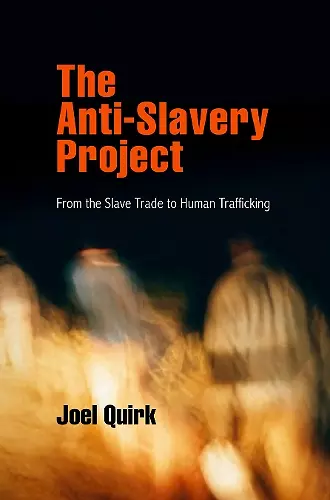The Anti-Slavery Project
From the Slave Trade to Human Trafficking
Format:Hardback
Publisher:University of Pennsylvania Press
Published:23rd Jun '11
Currently unavailable, and unfortunately no date known when it will be back

Historian and human rights scholar Joel Quirk examines the evolution of political opposition to slavery from the mid-eighteenth century to the present day. He offers an original diagnosis of the underlying causes driving one of the most pressing human rights problems in the world today.
It is commonly assumed that slavery came to an end in the nineteenth century. While slavery in the Americas officially ended in 1888, millions of slaves remained in bondage across Africa, Asia, and the Middle East well into the first half of the twentieth century. Wherever laws against slavery were introduced, governments found ways of continuing similar forms of coercion and exploitation, such as forced, bonded, and indentured labor. Every country in the world has now abolished slavery, yet millions of people continue to find themselves subject to contemporary forms of slavery, such as human trafficking, wartime enslavement, and the worst forms of child labor. The Anti-Slavery Project: From the Slave Trade to Human Trafficking offers an innovative study in the attempt to understand and eradicate these ongoing human rights abuses.
In The Anti-Slavery Project, historian and human rights expert Joel Quirk examines the evolution of political opposition to slavery from the mid-eighteenth century to the present day. Beginning with the abolitionist movement in the British Empire, Quirk analyzes the philosophical, economic, and cultural shifts that eventually resulted in the legal abolition of slavery. By viewing the legal abolition of slavery as a cautious first step—rather than the end of the story—he demonstrates that modern anti-slavery activism can be best understood as the latest phase in an evolving response to the historical shortcomings of earlier forms of political activism.
By exposing the historical and cultural roots of contemporary slavery, The Anti-Slavery Project presents an original diagnosis of the underlying causes driving one of the most pressing human rights problems in the world today. It offers valuable insights for historians, political scientists, policy makers, and activists seeking to combat slavery in all its forms.
In this excellent exposé of the history of slavery from its legal abolition to contemporary manifestations, Professor Joel Quirk fills a serious gap in the study of this issue and lucidly addresses the inevitable trait-d'union existing between past and present in slavery studies. * Leiden Journal of International Law *
Quirk has joined an increasing number of historians who should be applauded for devoting themselves to human rights, and he makes a valuable contribution by linking slavery to contemporary forms of exploitation. * Human Rights Quarterly *
Quirk further develops an analytical thread that has woven throughout much of his scholarship: the problems attendant to the inherited definition and iconography of the transatlantic slave trade. . . . His work remains pivotal in the field. * Human Rights Review *
The current anti-slavery movement labours under a delusion. The popular notion that some new and monstrous mutation burst upon the world at the end of the twentieth century serves no one well, least of all those in slavery. This original and insightful book helps us to see slavery clearly, both in the past and today. It is very difficult to solve a problem you do not understand, and more so if the problem is called by a different name every generation. The Anti-Slavery Project offers invaluable assistance to modern abolitionists and scholars along the lines of Einstein's dictum: 'Everything should be made as simple as possible, but no simpler.' * Kevin Bales, President of Free the Slaves *
In this path-breaking book, Joel Quirk provides a compelling analysis of the relationship between the global history of slavery and abolition and contemporary forms of human bondage. By focusing upon the limitations-as well as strengths-of the historical abolition movement, The Anti-Slavery Project offers new insights into the enduring yet constantly evolving challenges that have faced slaves, former slaves and other vulnerable groups at many different times and places. * Paul E. Lovejoy, York University *
ISBN: 9780812243338
Dimensions: unknown
Weight: unknown
344 pages